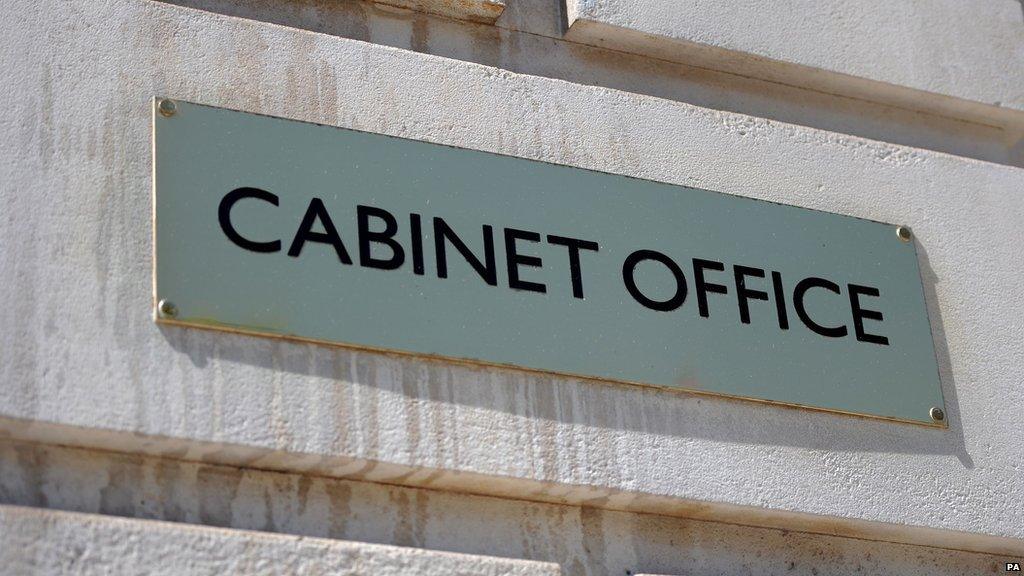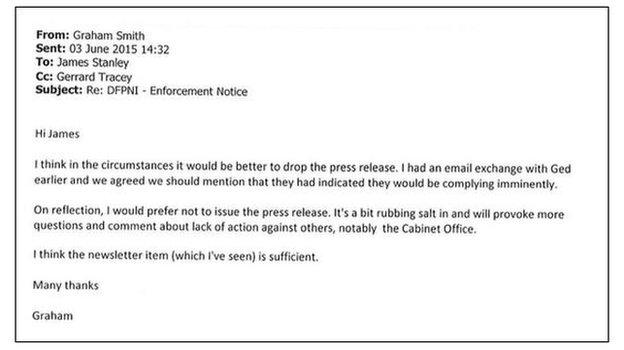Cabinet Office delays over freedom of information
- Published
- comments

Last month the Cabinet Office took control of government policy on freedom of information, removing it from the Ministry of Justice.
This takes FOI closer to the centre of power within Whitehall and the personal involvement of the prime minister. But how good is the Cabinet Office's own record on handling FOI requests?
New data obtained by the BBC shows a big increase in complaints to the information commissioner about Cabinet Office slowness.
The Information Commissioner's Office (ICO) has disclosed that the number of Cabinet Office delay cases which were not previously reported amounted to 90 in the two years 2013/4 and 2014/5. That's more than three times the comparable figure of 29 in the previous two years.
This is on top of the smaller number of investigations which have led to the ICO publicly issuing formal decision notices, external.
Inadequate performance
It is the latest evidence of the historically poor track record of the Cabinet Office, which has twice been subject to special monitoring, external by the ICO due to its inadequate performance on processing FOI applications. It's possible that the Cabinet Office may now face this for a third time.
"In the last two months or so we've issued six decision notices against the Cabinet Office for exceeding the statutory time limit - it's not a good record," says Graham Smith, the deputy information commissioner.
As well as obtaining direct control over freedom of information policy, the Cabinet Office has also taken over the "clearing house" from the Ministry of Justice. This is the team of officials who advise other government departments on how to handle sensitive FOI cases.
"The Cabinet Office should be setting a good example to the rest of Whitehall," Smith adds. "You would hope that they would want to be an exemplar".
Derided
A few days ago the ICO also rebuked the Cabinet Office for failing to comply properly with an investigation. A decision notice, external reported that the commissioner was "extremely disappointed" he had to serve a formal notice on the Cabinet Office to get cooperation.
However the ICO itself is often criticised and sometimes derided, external by those who feel that for political reasons it fails to take a tough enough stance over the Cabinet Office's failings. Some who believe this are FOI officers in other public authorities.

In June the commissioner issued an enforcement notice, external against the Department of Finance and Personnel in Northern Ireland, instructing it to deal with its extensive backlog of unanswered FOI requests.
But Smith told the ICO press office not to issue a press release announcing this measure, because it would "provoke more questions and comment about lack of action against others, notably the Cabinet Office".
Embarrassment
This document, external was revealed following an FOI request to the ICO by the information law consultant, Tim Turner, external.
Smith says he does not feel any embarrassment at this disclosure. He argues that the specific legal and practical circumstances for an enforcement notice to be issued do not exist in the case of the Cabinet Office.
His reasons for dropping the press release simply reflected the facts of life, he says: "We know how these things are talked about".
A Cabinet Office spokesperson commented: "The transfer of FOI policy to Cabinet Office fits with our lead on cross-Whitehall issues and our lead on wider transparency. It is acknowledged that because of the nature of the Cabinet Office our cases are generally of greater complexity and sensitivity."
Frustrating
The Cabinet Office also argues that in most instances the ICO's adjudications support their refusal to provide requested information. However their analysis ignores numerous rulings where the Commissioner has upheld complaints about the Cabinet Office failing to respond in good time or to provide requesters with assistance as the law requires.
I should declare an interest as someone who has made FOI requests to the Cabinet Office and assisted colleagues in doing so. This is one example of a frustrating recent experience:
21 March 2013: BBC makes FOI request to Cabinet Office for the cost of legal assistance provided for witnesses at the Leveson Inquiry.
2 August 2013: Cabinet Office replies, refusing to supply the information on the grounds it is intended for future publication (but without specifying a date).
20 August 2013: BBC asks the Cabinet Office to review its decision.
20 December 2013: BBC complains to ICO that the Cabinet Office has failed to respond to the internal review request.
31 December 2013: Cabinet Office responds, upholding the previous decision and still not providing a publication date.
15 January 2014: BBC complains to ICO about the Cabinet Office refusal.
19 March 2015: After taking over a year to consider the case, the ICO rules, external that the Cabinet Office stance is not reasonable and that it should give the information to the BBC without further delay. It states: "a denial of that right [of access to information] through procrastination is contrary to the spirit of the legislation".
April 2015: Cabinet Office decides to appeal against the ICO decision to the Information Rights Tribunal. The case is set to be heard in September.
25 June 2015: The Cabinet Office suddenly withdraws its Tribunal appeal and announces, external that the cost involved was £287,491.10 - a fact which may well have been considerably more important and newsworthy when the initial request was made 27 months previously than it is now.
- Published10 July 2015
- Published13 May 2015
- Published24 January 2014